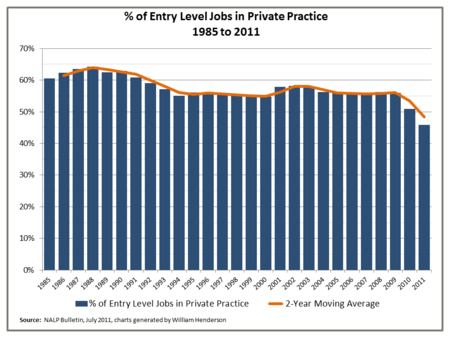Starting salaries at the nation’s largest firms dropped this year from $160,000 to $145,000 for law firms with 700 or more attorneys, according to a new study by NALP, the association for legal career professionals. The drop is a further sign that firms are grappling and adjusting to a new kind of market, and some feel the old legal market will never come back.
“The legal industry is going through exactly what so many other industries have gone through,” said James Leipold, NALP’s executive director. “Globalization and advances in technology are eroding jobs. Some jobs have gone over seas; some are better done by software and computers. Even if the market picks up, that’s still not necessarily going to increase head count [at law firms].”
Nationwide, 46 percent of law firms with more than 700 attorneys reported salaries at $160,000, down from 65 percent in 2009, the high water mark for salaries. Leipold said, in hindsight, the large salary increases from 2006 to 2009 occurred “too fast and too far.” Still, firms had been reluctant to back away from their starting salaries and so it has been a slow erosion.
But global law firms, which once paid the same salary for all office locations, now pay lower salaries in secondary markets
“The prevalence of $160,000 is less because they can get somebody for $145,00,” he said. “If you are in Denver or Cleveland, $145,000 is very competitive.”
In 2009, 90 percent of law firms with more than 700 attorneys in Los Angeles and Washington, D.C. reported salaries at $160,000. This year, only about two-thirds did so.
But even more concerning, the number of associates hired by law firms with 500 or more attorneys dropped from 4,745 in 2007 to 2,856 in 2011, a 40 percent drop since the start of the recession.
“There is a long term trendline showing a declining number of private practice jobs — and that is the economic engine that enables law schools to exist at current tuition levels,” writes William Henderson, a professor of law at Indiana University Maurer School of Law — Bloomington, in his blog, The Legal Whiteboard.
While referring to employment at the largest firms, Henderson said the changes impact all law students.
“A Harvard graduate instead of working in New York City will take a job in Rochester and that will displace a graduate of another law school.” He said. “We have huvge overcapacity issues. We need those [large law firm] jobs to make the math work [in legal education] and it is a long trend line down.”
But there is some good news. The overall median salary for entry-level attorneys increased from $115,000 to $125,000 this past year, according to NALP. This is due mainly to salaries at law firms with 251 to 700 attorneys, which increased from $125,000 to $145,000.
“The middle of the market is where it has increased,” Leipold said. “At the beginning of the recession [those law firms] were in a better situation. They had a lower cost structure and could deliver at a better price point. They could increase their talent pool because there was a lot of top talent not getting jobs at the largest firms. So in some ways their market had competition and that bumped up the salaries.”
Leipold said, despite the improvements, salaries are still largely flat and should remain that way until there is a significant demand for legal services.
But Henderson questions whether demand will ever return, arguing it is more of a long-term structural change in the marketplace. He said the chances will force law schools to get innovative in order to survive.
“A law school dean can’t solve the problem for everyone, but he can solve it for the 300 graduates of his school,” he said. “A few industrious faculty members and administrators will get creative and solve this from the bottom up.”
He said most law faculty, however, have not yet grasped the fact that the legal market has fundamentally changed.


